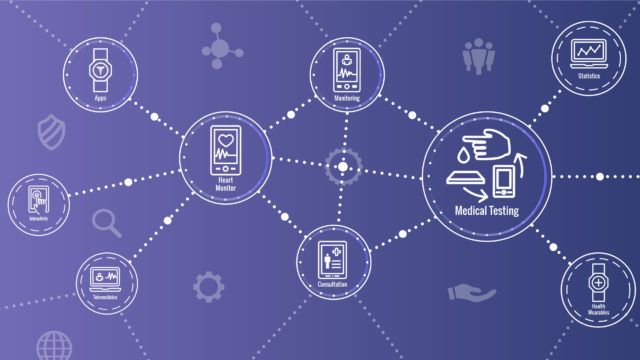SPRING 2020, THE EVIDENCE FORUM, INTERVIEW
 David Coman, MBA CEO Science 37 |  Jonathan Cotliar, MD CMO Science 37 |  Michelle Longmire, MD CEO Medable |  Mariah Baltezegar, MBA Exec. Director and Head PPA Virtual Trials Real-World Evidence Evidera |  Niklas Morton, MSc Sr. VP and Global Head Digital Services PPD |
Recently Mariah Baltezegar, MBA, Executive Director and Head of Peri- and Post-Approval Virtual Trials with Evidera, and Niklas Morton, MSc, Senior Vice President and Global Head of Digital Services with PPD, spoke with leaders of Science 37 and Medable, two companies Evidera and PPD partner with for design and implementation in this space and are at the forefront of providing digital solutions to advance clinical research, about the effect of COVID-19 on perceptions and availability of digital approaches to clinical research.
Mariah and Niklas are leading experts in the design and oversight of decentralized/virtual study options across all phases of clinical trials and peri- and post-approval studies, with the ability to engage external partners when necessary to provide optimal solutions. These interviews were done to provide relevant and timely insights on how our clients’ needs can be supported with digitally enabled solutions. For more information, contact [email protected].
How have, or do you think, patient perceptions/uptake of fully decentralized/virtual studies/technologies are changing in the era of COVID-19?
Jonathan Cotliar
Patients are typically not aware of all of the differences between traditional and virtual research, but in the current climate, it is difficult to keep patients motivated to participate in research using the traditional research model. Do participants want to travel to a hospital or doctor’s office that places them at an increased risk of exposure to COVID-19? Is that even possible given the number of locations experiencing strict quarantine measures? So far, the answer has increasingly been “no.” In our experience interacting with patients, the best way to motivate them is to simplify the research process and build it around their lives. If we can make research more convenient for them while mitigating some of the risks that the coronavirus presents, that’s what we should aim for.
Michelle Longmire
COVID-19 has resulted in significant adoption of decentralized clinical trial methodologies. Given the site closures globally, virtual visits, remote data capture, and remote site monitoring have become a leading way to ensure participants are safe and research is moving forward.
What advice would you give drug developers who want to keep study continuity by deploying decentralized/virtual approaches to their real-world data collection strategies and/or studies?
Michelle Longmire
I would suggest leveraging patient-centric digital strategies that help collect real-world data. For example, mobile applications enable prospective data capture of outcomes, while also being an important tool for consenting for other types of digital data collection across diverse data sources such as claims, medical records, or mortality registries.
David Coman
The virtual approach makes the most sense in the current climate, and it has proven to be effective in providing some measure of continuity in the drug development process. In our experience, it helps for sponsors to have a clear idea of the protocol, schedule of assessments, investigator information, target geographies, and desired timelines as they consider a shift to a virtual model. From there, companies should look for partners that can help them virtualize their research with a platform that supports the entire clinical trial ecosystem.
What are the biggest challenges drug developers face in trying to pivot traditionally designed studies to a decentralized/virtual model?
David Coman
Many companies do not yet understand how to virtualize their upcoming or ongoing studies, which may mean reducing the number of in-person interactions or collecting endpoint data virtually, because it may be new territory for these organizations. We’ve conducted more decentralized or virtual trials than any other company, and one of our strengths is our savvy medical affairs team. These experts can assist drug developers with all aspects of virtualization, including study design and delivery, endpoint virtualization, and change management.
Michelle Longmire
The challenge relates to rethinking the trial strategy across endpoint data capture and safety data capture. The good news is that with an experienced partner, a trial can be changed in flight or pre-launch to accommodate a decentralized model. This is not to say that every trial or every visit can be done remotely, but a model that enables hybrid design is generally very achievable and can reduce participant burden and healthcare center exposure during this challenging time.
Are there certain types of studies (development phases, therapeutic areas, etc.) to which it is easiest to transition or apply decentralized/virtual approaches?
Michelle Longmire
We have seen that digital and decentralized approaches can benefit the aspects of trials that tend to be universal, such as screening and off-study visits in the first instance. These approaches can really improve patient centricity in screening and on-study care across phases and therapeutic areas. With planning and consideration of which are the most important data to collect, most studies can transition to some aspects of the digital approach.
Jonathan Cotliar
We are currently engaged in clinical trials in a variety of therapeutic areas with enrollment sizes ranging from dozens to hundreds of patients in a variety of phases, so we know that virtualization can be applied to studies in every major therapeutic area and phase of research. It usually depends on how many in-person, “hands-on” interactions are required between participants and the trial team, and whether a physician or other specialist needs to be present for the administration or assessment of a particular procedure.
Which digital solutions or strategies are going to be most critical to utilize as the industry looks to virtualize studies given the global pandemic?
Michelle Longmire
Telemedicine and remote patient monitoring have become a cornerstone of ensuring patient safety and continuation of trials. Additionally, site monitoring and eSource have gained importance due to site closures.
David Coman
The virtual research model has become the standard of clinical research in the current climate given the massive worldwide quarantine measures currently in effect and the need for those infected with COVID-19 to be isolated. When it comes to digital solutions, it’s critical to employ a clinical trial platform that integrates systems, workflows, and processes for physician investigators, mobile nurses, and coordinators across the entire patient journey. This is especially crucial as study teams work across geographies. Comprehensive virtual trial platforms establish a centralized hub for trial activities such as electronic data capture, eConsent, electronic patient-reported outcomes (ePROs), telemedicine visits, patient notifications, and more.
How do you know which virtual/digital elements are the right fit for your study or patient population?
Jonathan Cotliar
These elements will depend on the study, but there are inherent advantages for many patient populations – think of patients with limited mobility, compromised immune systems, those who rely on others for transportation, or those with inflexible commitments such as work and childcare. The best thing for drug developers to do is consult with experts who can provide guidance on study design and delivery and endpoint virtualization. Science 37 works side-by-side with its clients to address these and other key trial aspects to come up with a trial design that maximizes efficiency, reduces time to market, and provides the necessary accommodations to ensure an optimal patient experience.
Michelle Longmire
Taking a look at what barriers exist in the traditional model and leveraging digital solutions to address barriers can help ensure that the digital strategy adds value and is a fit for the study. There is not a one-size-fits-all approach, so starting with barriers is key. Examining roadblocks to recruitment, screening, enrollment, retention, and evidence generation can help to identify the right fit for the study.
Tell us how telehealth can be used to conduct site visits virtually and the benefit telehealth presents for both patients and drug developers?
Jonathan Cotliar
Virtual trials, which are part of the telehealth landscape, reduce barriers to participation by bringing the research to the patients, which minimizes or eliminates the burden of making arrangements and traveling to a research site. Virtual trials have proven to reach and engage broader, more representative, and otherwise inaccessible populations of qualified candidates, which is a significant advantage for drug developers. For patients, the prospect of participating in a virtual trial – completing study visits within the comfort and convenience of home – means that trial participation can flex to their lives, which is undoubtedly an attractive option. Transforming the patient experience this way is reflected by improved retention: Science 37’s virtual trials have an astounding 90% retention rate. Together, these factors help to accelerate enrollment and improve efficiency in clinical drug development without sparing quality.
Michelle Longmire
Telehealth enables efficiency and improved patient centricity. In clinical trials, telemedicine can facilitate screening, evidence generation, and clinical care. The benefits include patient convenience and retention as well as improved patient safety in times of site closures.
Do you think the current need to virtualize studies because of COVID-19 will permanently change the way in which clinical trials are conducted (i.e., moving towards more decentralized/virtual models permanently, etc.)?
David Coman
As many are coming to realize, a virtual research model can help keep patients and study teams safe, support the wider public effort to slow viral spread, and provide business continuity during the COVID-19 pandemic. This approach may also reduce the burden on healthcare systems and personnel who are dealing with extraordinary circumstances due to the crisis. Going forward, the current situation will likely transform how the industry thinks about clinical trial execution and the inherent benefits of the virtual model. Patients already want research built around their lives – if we can make research more convenient for them while simultaneously mitigating some of the risks associated with a global pandemic, virtual trials seem like a logical way forward.
Michelle Longmire
I believe that current adoption will continue. Prior to COVID-19, we did not have as much evidence that decentralization was doable across therapeutic areas. Now, due to the necessity, we have a growing body of evidence that virtual and decentralized trial methodologies can be effectively applied at scale and across therapeutic areas. We are an industry driven by evidence and now that we have critical evidence, I anticipate we will see accelerated adoption.
 David Coman, MBA, is the chief executive officer at Science 37 and is focused on furthering the company’s mission to accelerate biomedical research by putting patients first. In pursuit of its mission, Science 37 makes it easier to participate by connecting patients with doctors and nurses through telemedicine visits and home health screenings, then managing trial logistics from an integrated, comprehensive platform. Science 37’s decentralized model is reimagining biomedical research to get more life-enhancing medicines to patients faster. Prior to joining Science 37, Mr. Coman led the data and analytics business at ERT after serving as the company’s chief strategy officer. He also previously worked for Quintiles (now IQVIA) as chief marketing officer and founder of its Digital Patient business. Mr. Coman earned his BA in advertising from Michigan State University and his MBA in marketing, entrepreneurship, and finance from the Kellogg Graduate School of Management at Northwestern University.
David Coman, MBA, is the chief executive officer at Science 37 and is focused on furthering the company’s mission to accelerate biomedical research by putting patients first. In pursuit of its mission, Science 37 makes it easier to participate by connecting patients with doctors and nurses through telemedicine visits and home health screenings, then managing trial logistics from an integrated, comprehensive platform. Science 37’s decentralized model is reimagining biomedical research to get more life-enhancing medicines to patients faster. Prior to joining Science 37, Mr. Coman led the data and analytics business at ERT after serving as the company’s chief strategy officer. He also previously worked for Quintiles (now IQVIA) as chief marketing officer and founder of its Digital Patient business. Mr. Coman earned his BA in advertising from Michigan State University and his MBA in marketing, entrepreneurship, and finance from the Kellogg Graduate School of Management at Northwestern University.
 Jonathan Cotliar, MD, is the chief medical officer for Science 37 and was previously the vice president of medical affairs, where he contributed as an investigator on a number of virtual clinical trials in addition to his work in support of business development and regulatory strategy. Dr. Cotliar is board-certified in both internal medicine and dermatology. He serves as director of inpatient dermatology at Harbor-UCLA Medical Center, with previous full-time faculty appointments at the David Geffen School of Medicine at UCLA, Northwestern University Feinberg School of Medicine, and City of Hope National Medical Center, where he was chief of the division of dermatology. Dr. Cotliar received his BA from Trinity College, his MD from the University of Kentucky College of Medicine, and completed his training in dermatology and internal medicine at the David Geffen School of Medicine at UCLA. While at UCLA, he completed an NIH-sponsored K30 Fellowship in translational investigation.
Jonathan Cotliar, MD, is the chief medical officer for Science 37 and was previously the vice president of medical affairs, where he contributed as an investigator on a number of virtual clinical trials in addition to his work in support of business development and regulatory strategy. Dr. Cotliar is board-certified in both internal medicine and dermatology. He serves as director of inpatient dermatology at Harbor-UCLA Medical Center, with previous full-time faculty appointments at the David Geffen School of Medicine at UCLA, Northwestern University Feinberg School of Medicine, and City of Hope National Medical Center, where he was chief of the division of dermatology. Dr. Cotliar received his BA from Trinity College, his MD from the University of Kentucky College of Medicine, and completed his training in dermatology and internal medicine at the David Geffen School of Medicine at UCLA. While at UCLA, he completed an NIH-sponsored K30 Fellowship in translational investigation.
 Michelle Longmire, MD, is the co-founder and chief executive officer of Medable, a privately held, venture-backed company focused on building a unified platform for clinical trial execution, enabling patient generated data to drive clinical research and precision and predictive medicine. She is a trained physician and entrepreneur driven to improve human health through advances in technology. Dr. Longmire received her BS in biology and political science and her MD from The University of New Mexico. She did her residency and was a postdoctoral research fellow at Stanford University School of Medicine and was an attending physician at Stanford University. She is a board-certified practicing dermatologist. Dr. Longmire also holds the honor of being a Howard Hughes Research Fellow.
Michelle Longmire, MD, is the co-founder and chief executive officer of Medable, a privately held, venture-backed company focused on building a unified platform for clinical trial execution, enabling patient generated data to drive clinical research and precision and predictive medicine. She is a trained physician and entrepreneur driven to improve human health through advances in technology. Dr. Longmire received her BS in biology and political science and her MD from The University of New Mexico. She did her residency and was a postdoctoral research fellow at Stanford University School of Medicine and was an attending physician at Stanford University. She is a board-certified practicing dermatologist. Dr. Longmire also holds the honor of being a Howard Hughes Research Fellow.
For more information, please contact us.




